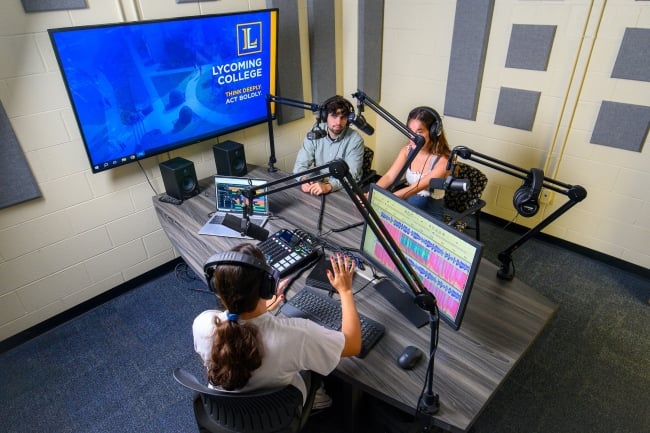You have /5 articles left.
Sign up for a free account or log in.

Students and faculty are producing a podcast about the history of Lycoming College in Pennsylvania. It’s part of a broader push by the college to invest in the humanities.
Lycoming College
As humanities programs face continued cuts and public skepticism of their value, a small Pennsylvania liberal arts college is setting itself apart by investing and creating more opportunities for its humanities majors.
Lycoming College, in Williamsport, recently opened an on-campus research center, established an annual undergraduate humanities research conference and launched a related journal to publish research students present at the conference. Academic leaders have also gotten students involved in a digital project focused on the institution’s history.
“Despite all of the negative news about the humanities, there are students out there who have a passion for the humanities,” said Kent Trachte, president of Lycoming College. “When we listened to our humanities students and their parents talk about why they worried about majoring in the humanities, the issue that came up was ‘How will this help me get a job?’”
Data verify that history, literature, philosophy and other humanities degrees do have value and are worth the investment. In the wide majority of states, humanities majors earn median incomes 40 percent higher than workers with only a high school degree, according to a 2023 report from the American Academy of Arts and Sciences.
The research, writing and critical thinking skills students develop in their college courses prepare them for a wide spectrum of career fields, including law, public service and communications. But those career paths aren’t always clear to humanities majors, which is something Lycoming has been working to change since it embedded an investment in the humanities into its 2021 strategic plan.
Could It Boost Enrollment?
“Cultivating the capacity to connect to and empathize with others is something the humanities have historically done, and [that] is critical to our ability to heal ourselves as a society and have a functioning democracy,” Trachte said.
He also believes there’s a financial case for investing in the humanities, especially as the nation’s small liberal arts colleges grapple with steep enrollment declines and a shrinking national population of college-age students.
While Lycoming hasn’t experienced as big an enrollment drop as some of its peer institutions, its total number of students fell from 1,132 in fall 2019 to 1,076 in fall 2023, according to the college.
“There is a segment of students who have a passion for the humanities,” Trachte said. “It’s not a large segment of students, but as a small college that only enrolls about 1,100 students, if we find 20 or 25 students who are interested in the humanities because they read that Lycoming College isn’t giving up on it and is investing in it and has exciting internship opportunities, it makes a difference in terms of our enrollment.”
Lycoming spent about $75,000 to launch the Humanities Research Center in 2022, which connects students with related experiential learning opportunities and supports undergraduate research. The college also received a $150,000 grant from the National Endowment for the Humanities to advance a digital project about the history of the college, which is meant to be a pilot for possible future projects. Through internships and course assignments, students can collaborate with faculty members on research, digitizing archival material, conducting oral history interviews, creating exhibits and producing a podcast.
And even as the number of students graduating with humanities degrees nationwide has declined significantly over the past decade, the college hopes this initiative will help grow its humanities enrollment by 20 percent in the next five years. While it’s too soon to tell if the resources offered by the Humanities Research Center have played a part, there has been a recent uptick in Lycoming’s tally of humanities majors, which reached 97 in 2022 after dropping to 79 in 2020, according to the college.
Another piece of the college’s investment in the humanities is its launch of the student-led Lycoming Undergraduate Humanities Research Conference last year and the debut of the Mid-Atlantic Humanities Review: A Journal of Undergraduate Research this month.
Both the conference and the journal, which are also open to students at dozens of other colleges in the region, create more opportunities for humanities majors to get hands-on experience in writing, editing and organizing events. They also allow students’ research to reach a wider audience outside the classroom.
Brand Awareness
Trachte said he hopes both initiatives will help raise Lycoming’s profile.
“There’s 2,000-plus small colleges across the national landscape, and it’s difficult to find something that truly sets you apart,” Trachte said. “Both the conference and now the journal enhance awareness of Lycoming College among our peer institutions.”
Lindsay Currie, executive officer of the Council on Undergraduate Research, said many other colleges have also used undergraduate research journals as a marketing and recruitment tool.
“It’s a great way to show what’s coming out of the campus, how they’re thought leaders and how they’re supportive of their students,” she said. Further, it can also help “to differentiate a small school like Lycoming to show how it’s investing in its students, prioritizing the humanities, bringing an entire region to the campus and making it a real destination for humanities work.”
Interest in undergraduate research has expanded tremendously over the past two decades, with CUR’s membership growing from 3,354 in 2002 to 13,532 in 2022. Much of that rise was driven by the work of education professor George Kuh, who in 2008 identified undergraduate research as a leading high-impact practice capable of increasing retention and graduation rates.
“It embeds students in the campus life, in their degree, in their discipline,” Currie said. “But it also helps them garner these skills that are beneficial both for those who are on the trajectory for employment and those who want to go on to graduate school.”
Experiential Learning
Andrew Leiter, an English professor at Lycoming and director of the Humanities Research Center, says his goal is to give humanities students the chance to do more with their research than writing a paper and turning it in for a grade.
“Our humanities students here have been traditionally more oriented toward the isolated scholar model,” he said. “A lot of our other disciplines have a lot more experiential learning opportunities.”
Leiter, who helped lead the effort to ramp up Lycoming’s humanities investments, serves as faculty editor, alongside three student editors, to produce the peer-reviewed journal, which is available in print and digital formats.
Although the articles published in the journal—like most of the roughly 250 undergraduate research journals in the country—likely won’t rise to the level of being useful for professional academics, publishing them gives students a taste of what graduate school or a research- and writing-heavy career may entail.
“We’ve been fighting this battle in the humanities and liberal arts for a long time. We prepare you for everything, but we’re not preparing you for a specific job outcome,” Leiter said.
If those disciplines want to attract more students, especially first-generation and lower-income students, faculty members have to be able to show them how their education can translate to a job.
“When you can do that, you can touch base with those students who are most interested in reading, writing, history, language and philosophy,” he said.
Working as a student editor for the journal pushed Dominick Philip, a senior triple majoring in comparative literature, philosophy and economics, to reconsider his career path. He’d originally planned to major in economics and pursue law school. But after taking some philosophy courses and finding faculty mentors at Lycoming, he had a new framework for examining the world around him. It was exciting, though he still worried majoring in philosophy wasn’t practical.
Then he got a job at the Humanities Research Center working on the college’s grant-funded history podcast and helped organize last year’s undergraduate research conference. He’s currently a student editor for the journal. Law school isn’t off the table entirely, but Philip is now considering graduate programs in comparative literature and applying for a Fulbright fellowship.
“I wonder if I had gone to a different school and come in as an economics major, would I have ever been exposed to a humanities path and been motivated to change?” Philip said. “That says something not only about the funding Lycoming has put toward the humanities, but also the work of the faculty to mentor students and help them find things they’re passionate about.”




